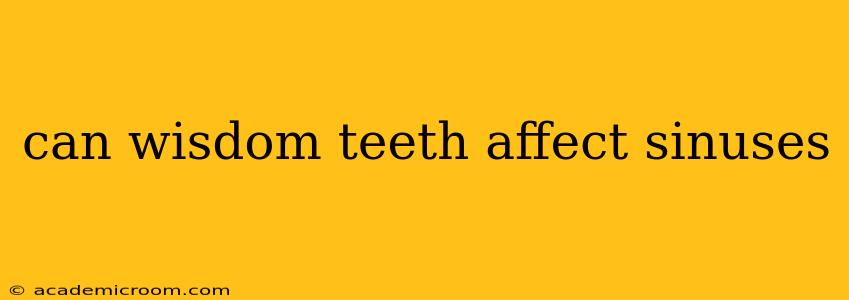Wisdom teeth, the third molars located at the back of your mouth, can sometimes cause problems that extend beyond simple discomfort. One area of concern that often arises is their potential impact on your sinuses. While not a direct, immediate effect for everyone, the proximity of wisdom teeth to the maxillary sinuses (located in your upper jaw) means complications can arise. This article will explore the potential connection between wisdom teeth and sinus problems, addressing common questions and concerns.
How Close Are Wisdom Teeth to the Sinuses?
The maxillary sinuses are air-filled spaces located above the upper teeth. Your wisdom teeth roots are often quite close to, or even in contact with, the floor of these sinuses. This anatomical proximity is the key factor explaining the possible connection between wisdom teeth and sinus issues.
Can Impacted Wisdom Teeth Cause Sinus Problems?
Yes, impacted wisdom teeth—those that don't fully erupt—can sometimes contribute to sinus problems. The reasons are multifaceted:
-
Infection: An impacted wisdom tooth can become infected. This infection, if left untreated, can spread to the adjacent sinus cavity, causing sinusitis (inflammation of the sinus lining). Symptoms of sinus infection might include facial pain, pressure, nasal congestion, and possibly fever.
-
Inflammation: Even without infection, the presence of an impacted wisdom tooth and the surrounding inflammation can put pressure on the sinus cavity, potentially leading to discomfort and sinus-related symptoms.
-
Surgical Intervention: The surgical removal (extraction) of impacted wisdom teeth sometimes involves opening into the sinus cavity, especially if the roots are close to or within the sinus floor. This procedure, while generally safe, can temporarily increase the risk of sinus complications, like a sinus infection or dry socket (a painful condition affecting the extraction site).
What are the Symptoms of Sinus Problems Related to Wisdom Teeth?
Symptoms can overlap with those of a standard sinus infection and include:
-
Facial Pain or Pressure: Pain might be concentrated in the upper jaw or cheek area, often worsening when bending over.
-
Nasal Congestion: Difficulty breathing through your nose is common.
-
Postnasal Drip: Excess mucus draining down the back of your throat.
-
Headache: Sinus pain can cause headaches.
-
Fever: A sign of infection.
-
Bad Breath (Halitosis): An infected wisdom tooth may contribute to bad breath.
It's crucial to understand that these symptoms aren't automatically indicative of wisdom tooth-related sinus problems; many other conditions can cause similar symptoms. A proper diagnosis is crucial.
Can Wisdom Tooth Extraction Cause Sinus Problems?
While wisdom tooth extraction is generally a safe procedure, there's a small risk of sinus complications, particularly if the roots are close to or within the sinus. The most common complication is a communication or hole between the mouth and sinus. This usually heals on its own, but sometimes it can lead to:
-
Sinus Infection: Bacteria can enter the sinus through the opening.
-
Air in the Sinus: Air can enter the sinus from the mouth, causing discomfort.
How Are Wisdom Teeth-Related Sinus Problems Diagnosed?
A dentist or oral surgeon will typically conduct a thorough examination, including reviewing your medical history and X-rays to assess the position of your wisdom teeth and their proximity to the sinuses. They might refer you to an ENT (ear, nose, and throat) specialist for further evaluation if sinus involvement is suspected.
How Are Wisdom Teeth-Related Sinus Problems Treated?
Treatment depends on the specific problem. For infections, antibiotics might be prescribed. If a communication between the mouth and sinus exists after extraction, it typically heals spontaneously. However, close monitoring is often recommended, and you may be given instructions to avoid nose blowing or straining.
Disclaimer: This information is for educational purposes only and does not constitute medical advice. Always consult with a dentist or oral surgeon for any concerns regarding your wisdom teeth and their potential impact on your sinuses. They can provide accurate diagnosis and appropriate treatment based on your specific situation.
